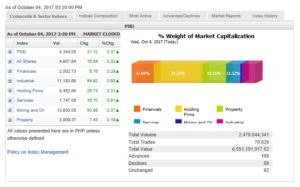The World Bank has again cut its growth projections for the Philippines for this year and next, which the Washington-based multilateral lender blamed on “slower than expected” implementation of public infrastructure projects.
“In 2017, the economy is projected to expand at a slightly slower pace than 2016, at 6.6 percent. The delay in the anticipated push of the planned government infrastructure program has been contributing to the moderation of fixed capital formation growth, softening the growth prospect for the year,” the World Bank said in its East Asia and Pacific Economic Update October 2017 report released yesterday.
The World Bank in July lowered to 6.8 percent from 6.9 percent previously its gross domestic product (GDP) growth forecast for the Philippines, noting that government consumption and investment growth “somewhat weakened” recently following a similar path in public spending during the first quarter even if exports and private consumption kept a strong showing.
The lender’s 2017 forecast was nonetheless still within the government’s 6.5-7.5 percent target range.
For 2018, the World Bank’s GDP growth projection was reduced to 6.7 percent from 6.9 percent previously, below the Duterte administration’s 7-8 percent yearly growth target from 2018 to 2022.
In 2019, the World Bank expects Philippine economic expansion of 6.7 percent, a pace also slower than the government target.
The economy grew 6.9 percent last year, among the fastest in the region.
In general, “the medium-term growth outlook remains positive and is expected to be anchored in growth in the Philippines’ main trading partners which would lead to higher external demand, while imports would remain elevated due to necessary imports of intermediate and capital goods, including for the infrastructure program,” the World Bank said.
Moving forward, “as the public infrastructure program gains traction, capital outlays and construction activities are expected to rise,” according to the World Bank.
The Duterte administration early this year unveiled its ambitious “Build, Build, Build” program aimed at ushering in “the golden age of infrastructure” after years of neglect.
Under “Build, Build, Build,” the government will roll out 75 flagship, “game-changing” infrastructure projects, with about half targeted to be finished within President Duterte’s term, alongside plans to spend a total of up to P9 trillion on hard and modern infrastructure until 2022. —BEN O. DE VERA


